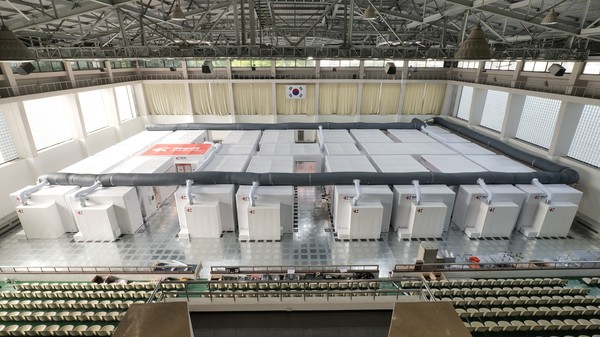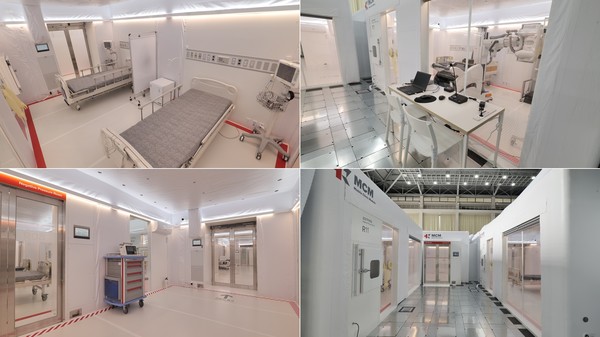
Gyeonggi Province said it would install mobile clinic modules (MCM) to use them as a treatment community center for Covid-19 patients in self-treatment and short-term treatment amid the prolonged Covid-19 pandemic.
The mobile clinic modules (MCM), developed as the world’s first mobile negative-pressure room by Korea Advanced Institute of Science and Technology, will be operated as the second special community treatment center, Gyeonggi Province said.
Developed by professor Nam Tek-jin at the Industrial Design Department at KAIST, MCM provides advanced medical equipment in a negative-pressure room.
The special community treatment center will be set up inside the indoor gymnasium of the Human Resources Development Center.
It will accommodate 28 negative-pressure beds, consisting of 14 rooms, each with two beds and one multi-purpose room for X-ray and treatment. The treatment center will start operation on Sept. 13.
Unlike the conventional community treatment center, which isolates mild Covid-19 patients for two weeks, the MCM-based center will be a short-term treatment center linked with self-treatment. If patients in self-treatment show symptoms that require medical intervention, they will be moved to MCMs, stay for one to three days, and get follow-up measures.
An MCM bedroom has an individual bathroom, and the negative-pressure system, ventilation, and automatic door opening and closing can be controlled centrally.
Patients who show abnormal symptoms during treatment will be transferred to a hospital, and if they offer no special issues, they are transferred back to the self-treatment facility.
Gyeonggi Provincial Medical Center Ansung Hospital will operate the special community treatment center. One or two doctors, three nurses, two nursing assistants, one administrative worker, two or three quarantine officials, and one video technician will work in three shifts.
Also, over 20 workers, including KAIST researchers, firefighters, police officers, and other service workers, will be dispatched to the treatment center.
Gyeonggi Province plans to operate the special community treatment center until Oct. 10 and adjust the operation period depending on its performance and the Covid-19 situation.
During the treatment center operation, KAIST will conduct a study to raise the efficiency of negative-pressure rooms and build the optimal model. It will also continue to do R&D for a wastewater treatment system, portable toilets optimized for infected patients, and an MCM user interface for mobile devices.
Korea Institute of Radiological & Medical Sciences and Konyang University Hospital have also introduced the MCM.
KIRMS installed a patient ward of four beds capable of caring for serious Covid-19 patients in January, and two mild Covid-19 patients received treatment here.
Konyang University Hospital installed an MCM in the emergency room, and 138 patients used it for two months, from June to July.

Professor Nam, who oversaw the design and the project, said if an indoor gymnasium is available, it can be transformed into a special community treatment center equipped with medical gas, wastewater treatment, and a negative-pressure facility within two weeks.
Bae Choong-sik, leader of the KAIST’s Covid-19 Response Science and Technology New Deal Project Team, said an MCM was a dramatically successful case because it took only about a year from R&D in July last year to commercialization.
“To respond to Covid-19 swiftly, KAIST is conducting R&D and empirical research not only in the mobile negative-pressure ward but also in multiple quarantine technologies,” Bae said.
The MCM was recognized in functionality, economic feasibility, effectiveness, original design, and aesthetics.
It won the prestigious Red Dot Design Award in product design and Best of the Best in communication design in Germany.

